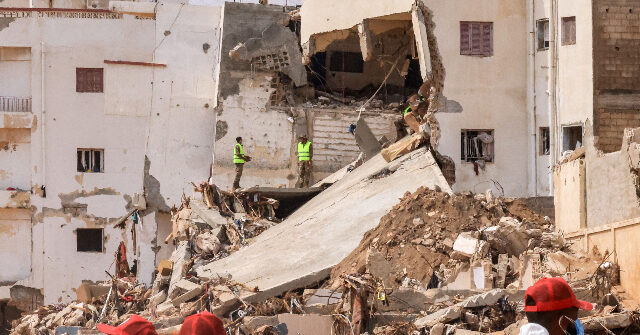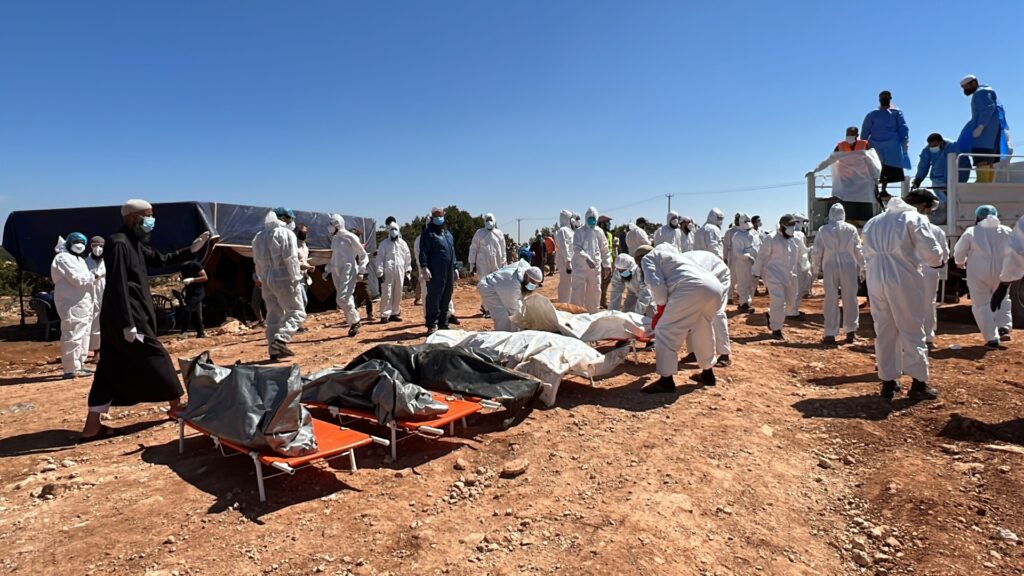Top News
Libya Arrests Derna Mayor and Other Officials for Negligence After Killer Flood

The attorney general of Libya announced on Monday that the mayor of Derna and seven other top officials had been arrested for “mismanagement and negligence” in connection with the catastrophic flood that appears to have killed some 15,000 people on September 11.
The announcement is intriguing because the Libyan attorney general, Al-Seddik al-Sour — also known as the prosecutor general — is based in Tripoli, the headquarters of the western half of Libya’s divided government. Derna is controlled by the eastern government, which is based in Tobruk.
The statement said Derna Mayor Abdel-Moneim al-Ghaithi, a local official in charge of water resources, and the others were charged with “bad management” leading to the collapse of two key dams in Derna during Mediterranean Storm Daniel.
The other officials named in the arrest announcement were all current and former members of the Derna Water Resources Authority and Dams Management Authority. It was unclear from Libyan media reports if any of the officials were actually taken into custody.
The broken dams unleashed a tsunami of flood water that washed away a quarter of the city. Many of the victims were carried out to sea, where rescue workers still struggle to recover their bodies.
WATCH: Rescuers in Libya Respond to Deadly, Massive Flooding
Libyan Red Crescent Bayda via Storyful
An angry mob set fire to al-Ghaithi’s home on September 18 during one of many demonstrations held at the premises. The mayor tried to win some goodwill by getting out in front of rescue efforts (and predicting a much higher death toll of 20,000 than any other Libyan official), but he became a focus of anger for residents who said they were given no warning of the impending flood and had no idea the dams were in such poor condition.
A minister from the Tobruk-based eastern government said that al-Ghaithi had been suspended from his post and was no longer the mayor of Derna.
The prime minister of the eastern government, Usama Hamad, said every member of Derna’s municipal council had been sacked and referred for investigation. Based on its response to the attorney general’s announcement, the eastern government seems willing to let the western administration conduct that investigation.
With al-Ghaithi’s house burned down, the new center of protest activity in Derna became the al-Sahaba mosque, which has a distinctive golden dome that demonstrators can perch upon to shout slogans and wave banners. On September 18, those slogans included calls for the head of the eastern parliament, Aguila Saleh, to resign.
Protesters gathered for a demonstration outside the surviving al-Sahaba mosque in Libya’s eastern city of Derna on September 18, 2023. (HUSSAM AHMED/AFP via Getty Images)
“Aguila, we don’t want you! All Libyans are brothers!” the demonstrators chanted, a sign that Derna lost whatever faith it had in the Tobruk government. Some outside observers speculated the protests were coordinated, especially since the mosque has been off-limits to the public since the floods but was suddenly swarming with people on Monday.
If the protests are indeed coordinated, the goal is presumably to get Derna to break away from the eastern government. A minister in Tobruk on Tuesday asked all journalists to leave Derna, prompting accusations that the eastern parliament wants to punish the city for embarrassing it.
ABC News noted that decades of warnings about the flagging condition of the dams were ignored, including some issued before the 2011 invasion by former United States President Barack Obama that wiped out Libya’s central government and plunged the country into chaos:
The dams were built by a Yugoslav construction company in the 1970s above Wadi Derna, a river valley which divides the city. They were meant to protect the city from flash floods, which are not uncommon in the area. The dams were not maintained for decades, despite warnings by scientists that they may burst.
A report by a state-run audit agency in 2021 said the two dams hadn’t been maintained despite the allocation of more than $2 million for that purpose in 2012 and 2013.
A Turkish firm was contracted in 2007 to carry out maintenance on the two dams and to build a third one in between them. The firm, Arsel Construction Company Ltd., said on its website that it completed its work in November 2012. It didn’t respond to an email seeking further comment.
The Wall Street Journal (WSJ) on Monday traced a “long trail of conflict and corruption” behind the Derna dam collapse, beginning during the regime of ousted dictator Moammar Qaddafi and running through the years when Islamic State extremists controlled the city before they were ejected by the military commander of the eastern government, Khalifa Haftar.
According to the WSJ’s history, the Derna dams were conceived in 1978 as “part of Qaddafi’s plans to scale up Libya’s economy after he came to power a little under a decade earlier.”

People who lost their lives in floods are buried in mass graves as the search and rescue operations continue in Derna, Libya on September 16, 2023. (Hamza Al Ahmar/Anadolu Agency via Getty Images)
The international isolation that came after the Lockerbie bombings threw the dam projects into chaos, resulting in subpar construction that alarmed foreign engineers who were brought in after U.N. sanctions were lifted in 2003. Some of those engineers were caught up in the turbulence of Qaddafi’s mercurial rule, nervously pulling out of the country as their recommendations on Derna were ignored or underfunded due to power struggles within the Qaddafi regime.
After Qaddafi fell, officials across Libya found themselves with about $10 billion in debt and very little to show for it, the funds allocated for infrastructure having been squandered by Qaddafi, his sons, and a legion of squabbling regime officials.
The ensuing years of strife and civil war all but guaranteed nothing would be done about improving the dams. Derna’s Islamic State conquerors were not much interested in civil engineering, and neither was Haftar. At one point, the water minister of Derna was locked out of his office by militia fighters loyal to his cranky deputy. The minister froze all funding for water projects, the government allocated no further funds for improvement, and then Mediterranean Storm Daniel arrived to extract a terrible price for those decades of neglect.
Read the full article here


















